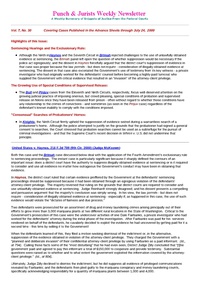Loaded on
July 1, 2000
published in Punch and Jurists
July 24, 2000
Here the Ninth Circuit affirmed its long-standing precedent that a general consent to searches given by probationer as a condition of his probation does not justify a warrantless search of his home for general investigatory purposes.
With uncommonly blunt words, the Ninth Circuit reaffirmed its long-standing position that …
Loaded on
July 1, 2000
published in Punch and Jurists
July 24, 2000
The defendant in this case was a former police officer who plead guilty to two counts of armed robbery and one count of use of a firearm during the commission of a felony. Challenging his sentence on appeal, he argued, inter alia, that the district court erroneously sentenced him …
Loaded on
July 1, 2000
published in Punch and Jurists
July 24, 2000
United States v. Bull, 214 F.3d 1275 (11th Cir. 2000) (Judge Roney)
United States v. Pinjuv, 218 F.3d 1125 (9th Cir. 2000) (Judge Alarcon)
According to the latest Department of Justice Statistics, between 1990 and 1999, the fastest growing segment of our prison population was represented by a 54 …
Loaded on
July 1, 2000
published in Punch and Jurists
July 24, 2000
The defendant in this case argued that the sentencing court had erred by including in its written judgment a requirement never mentioned orally at the sentencing hearing - namely that he contribute to the cost of his mental health treatment imposed as a special condition of supervised release. The …
Loaded on
July 1, 2000
published in Punch and Jurists
July 24, 2000
In this case, disagreeing with the position taken by the Fifth Circuit in U.S. v. Clark, 203 F.3d 358 (2000), a divided panel held that a habeas challenge under 28 U.S.C. § 2255 cannot be used by a Federal prisoner, who is blocked from bringing a direct challenge to …
Loaded on
July 1, 2000
published in Punch and Jurists
July 24, 2000
United States v. Bull, 214 F.3d 1275 (11th Cir. 2000) (Judge Roney)
United States v. Pinjuv, 218 F.3d 1125 (9th Cir. 2000) (Judge Alarcon)
According to the latest Department of Justice Statistics, between 1990 and 1999, the fastest growing segment of our prison population was represented by a 54 …
Loaded on
July 1, 2000
published in Punch and Jurists
July 24, 2000
In this case the Sixth Circuit held that a fraud scheme, in which victims wired funds to third parties who later transferred the funds to the defendants, was punishable under a federal money laundering statute, 18 U.S.C. § 1956, as transactions involving "proceeds" of unlawful activity even though at …
Loaded on
July 1, 2000
published in Punch and Jurists
July 24, 2000
In this case the Fourth Circuit joined the Curcuit split by agreeing with the Fifth Circuit that proceedings under the Hyde Amendment (18 USC § 3006A) are civil in nature and are thus governed by the Fed.R.Civ.P. and not the Fed.R.Crim.P.
In this case the Fourth Circuit joined …
Loaded on
July 1, 2000
published in Punch and Jurists
July 24, 2000
Here the 7hh Circuit rejected a challenge to the use of illegally seized evidence at sentencing - a rule followed by most Circuits; but the panel expressly left open the question of whether suppression would be necessary if the police act egregiously.
This case and the Ninth Circuit's …
Loaded on
July 1, 2000
published in Punch and Jurists
July 24, 2000
Both this case and the Seventh Circuit's decision in U.S. v. Brimah, 214 F.3d 854 (7th Cir. 2000) give a detailed review of some of the issues related to the application of the Fourth Amendment’s exclusionary rule to sentencing proceedings. The instant case is particularly significant because it sharply …
Loaded on
July 1, 2000
published in Punch and Jurists
July 24, 2000
This is an interesting drug conspiracy case which highlights an important distinction between a drug conspiracy and a buyer-seller relationship between drug dealers. In this case, Derrick Hardin, a long-time drug dealer in Indiana (“Hardin”), became dissatisfied with the wholesale prices for cocaine that were being offered by his …
